SUMMARY
This is AI generated summarization, which may have errors. For context, always refer to the full article.
![[Only IN Hollywood] Surprise, surprise – Dolly de Leon is the talk of Cannes!](https://www.rappler.com/tachyon/2022/05/dolly-de-leon.jpg)
CANNES, France – “Her committed turn not only makes her the defining supporting performance of the year thus far, but also, if enough Academy members make a note to focus on quality (and not simply name recognition as they can often do), she could be the frontrunner walking into awards season.”
Dolly de Leon, the Filipina actress Variety critic Clayton Davis was raving about for her performance in Triangle of Sadness, in main competition in this year’s Cannes Film Festival, walked over to an Italian trattoria where we met her for the first time. It was late afternoon on a cobblestoned street off busy Croisette.
Dolly, bespectacled, casual in a tee and pants, is diminutive, but these days, in this most prestigious film festival, she is earning a giant stature. Like many festival goers, we were surprised by the appearance of a Pinay actress in writer-director Ruben Östlund’s Palme d’Or contender, Triangle of Sadness.
And we were stunned by Dolly’s performance. She transforms, thanks to a plot twist, from a toilet cleaner in a luxury yacht to a leader. It’s such a compelling breakout performance that our critic and journalist colleagues here kept asking us, “Did you watch that Filipina actress in Triangle of Sadness?”
Ruben, noted for his Cannes winners, The Square (Palme d’Or) and Force Majeure (Un Certain Regard), displays again his mastery of social satire in Triangle of Sadness.
Ruben morphs a cruise for the uber-rich and mostly Filipino crew into a funny, biting statement on class, race, wealth, and social media. Dolly and the cast, which includes Woody Harrelson, Harris Dickinson, Charlbi Dean, Hanna Oldenburg, Oliver Ford Davies, Zlatko Buric, Vicki Berlin, and Carolina Gynning, are excellent.
Dolly, a University of the Philippines Diliman theater arts major who was born and raised in Manila, graciously fielded our congratulations. The actress, whose parents’ roots are from Ilocos and Visayas, blossomed from theater to TV soaps and film.
She has worked with noted Filipino directors, including Lav Diaz, Erik Matti, Raymund Ribay Gutierrez, and Antoinette Jadaone.
The mother of four said she has read the glowing reviews singling her out. The Variety review even mentioned her in the headline: “There Will Be a Triangle of Sadness If Awards Aren’t Given to Ruben Östlund and Dolly de Leon.”
Clayton also wrote: “The other awards-worthy point is the utterly lived-in and commanding performance of Dolly de Leon, a Filipina actress unknown Stateside, who could become a passionate contender. Playing Abigail, the toilet manager of the luxurious yacht, her small stature does not hold her back from becoming the acting giant of the sprawling tale.”
“Wouldn’t it be amazing to see De Leon, in addition to Michelle Yeoh, a leading actress contender for A24’s Everything Everywhere All at Once, make history for the AAPI community, who are too often ignored?”
Los Angeles Times commented, “What will this year’s Cannes jurors think of Östlund’s mash-up of Buñuelian chaos and Gilligan’s Island, complete with Woody Harrelson as increasingly soused skipper? Will they take note, as I hope they do, of Dolly de Leon’s revelatory performance as a yacht cleaning woman who nails her own ‘I am the captain now’ moment? Stay tuned.”
IndieWire opined, “…The great Filipino actress Dolly de Leon (Verdict), who rises from the bowels of the superyacht, grabs this film by the throat, and chokes it so hard that you can’t help but feel a faint pulse throbbing to life from under all that irony. If not for De Leon’s bold and heartsick performance, Triangle of Sadness would fail to achieve any real measure of the physical discomfort that has animated so much of Östlund’s previous work.”
Despite her busy schedule of screenings and photo calls in Cote D’Azur, Dolly agreed to an email interview; she sent back her answers as audio recordings. Later, she found time to meet us for a casual chat over risotto and pasta.

The following are excerpts from our interview.
Congratulations on your performance. How did you land the Abigail role? Did you audition by Zoom, considering the pandemic? Was there a final in-person audition with director Ruben Östlund?
Pauline Hansson, the casting director, flew to the Philippines. They held auditions there for 11 days. And I auditioned. It was a live, face-to-face audition because this was pre-pandemic.
This was in mid-2018. They made me do three scenes, which were lifted from the actual script. The scenes are in the film. After that, I believe that Pauline would send clips of the auditionees that she chose. And these would be sent to Ruben.
From there, Ruben would organize Skype meetings with us individually, where he would talk to us. He didn’t make me act anymore. I didn’t audition for him anymore.
We just had a conversation for one hour. We talked about the character, Abigail. We talked about what my take on her is. I gave him my personal impression of her and how I see the character should be portrayed, her background and things like that.
We talked about his directing process, how he does it, how he works. He got into detail with that. So, it was really a meeting on checking how I would understand him because of the language barrier, because he’s Swedish.
Maybe he assumed because I’m Filipino, I only speak Tagalog or Filipino. So yeah, there was no final audition with him. It was really just that, through Skype.
Did Ruben tell you how he came up with your Filipino character? What were your initial reactions when you first read the script, especially upon reading your character’s trajectory and lines?
Yes, I did ask him how he came up with the Filipino character because she could have been any nationality. He said that he’s had experience or have heard a lot of stories about Filipinos working in yachts and about Filipinos working as domestic helpers in other countries.
So, he’s very familiar with that. Actually, I also noticed that in Sweden, they’re very aware that a lot of us Filipinos are working abroad doing those kinds of jobs.
I also worked with a Swedish director before, Johanna Pyykkö, and it’s the same thing. She’s also familiar with that. So, the Swedes are very aware of what’s going on with us as Filipinos around the world.
Wow, when I first read the script, my mind was blown because first of all, it’s a very original concept to me for the hierarchy to shift, especially to shift to a person who you would never expect the power to come from.
Especially Abigail – I loved her character so much. The way her character shifts from a simple working-class woman to this powerful badass in control and really a force to reckon with towards the end of the film. So that was a very exciting part for me to play.
And your reaction to the script in the film as a wicked social satire on wealth, class, race, and social media influencers, among others?

It’s about time we listen to these messages from filmmakers who are making a very bold statement about the way the world is working today. The way everything we do is controlled by social media, beauty, youth, being perfect, being flawless.
And that all of that really means nothing. Well, it means something because you make a lot of money from it but what does that do to us as humans? How does that impact our society? How does it impact our youth and influence them into becoming the same kind of people that all these people they look up to are today?
I thought it was a very exciting concept. How we are today as human beings? How we choose to be really has an impact on how we’re living. It’s a very important piece and I think every person should watch it.
Not just people without influence but also people with influence and people who don’t really care about influence because it says a lot about humanity’s mentality nowadays.
Who helped Ruben write the Tagalog lines of your character and the luxury ship crew?
Those Tagalog lines were all by the actors. He would just talk to the actors and he would say, “Oh, say this in your language. In Philippian.”
He meant Tagalog or Filipino. “Say this line in Philippian.” And us actors, we would just say the lines in Filipino.
How much fun did you have portraying your character, especially as the story progressed in the film’s chapter three?
I had the best fun shooting this film. Oh my God. It was, I would say, one of the best filming experiences I’ve ever had in my entire life. It was great.
Coming to set was an exciting part of the day, waking up every morning, getting ready, going to set. It was also a combination of nerves. I was always nervous when I would go to set because I knew that I was doing something really important and something I loved.
I observe that about myself as an actor. When it’s something I really like, and I really am looking forward to doing, I’m nervous about that.
Oh my God, that was the scene that I was really looking forward to and very nervous to shoot. But it was great fun. It was the best fun I ever had. It was tiring because Ruben would make us do take after take.
I think the most takes I did was about 45 or 47 because we would only shoot one sequence per day. It was the same sequence over and over again because Ruben believes that if you do a scene over and over again, then you’ll get it better and better.
And you’ll get to the essence of it, forget that you have to remember the lines, and just go with what the character is going through organically. I know I’m going off topic now but I really have to share.
For me, this is fine because that’s my training in theater. That’s what we’re used to, rehearsing, doing it over and over again. And play with it, improvise, and find it. And that’s the term we use – to find it.
And hopefully, eventually, find it and just have fun with it by the end. You don’t even know where you are anymore. Your body’s just doing it organically and instinctively. It was really so much fun.
In what ways did your character resonate with you? How much do you identify with Abigail?
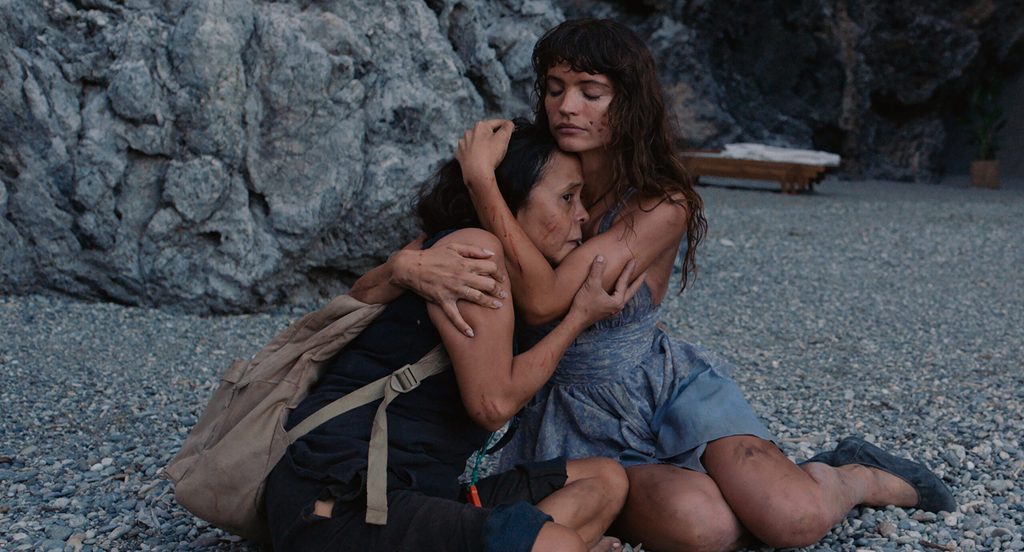
I identify with Abigail a lot. We have a lot of similarities, although we also have a lot of differences, but I do identify with her. Her sense of power resonates with me because I like to believe that I’m a powerful woman, even if most of the time I feel weak. That’s the similarity that Abigail and I have.
Most of the time, she feels weak, powerless, and helpless because of circumstances in her life and how she has to do things in order to survive the world. I feel the same way. I mean, I’m a mother. I have four children and the struggle is real with me having to go out, work, and film, leaving my kids at home.
And I’ve also experienced being away from home for a long period of time. I know how it feels to be Abigail in that sense of being away from home, away from your loved ones, living in a strange land, speaking a language that is not your own.
I realize, yeah, I find myself interpreting or translating my own lines because I forget that I need to speak in English so that everyone will understand me.
In many ways, we also share the same frustration with the everyday things that happen in life, in being a woman, in gender equality. It’s really not easy being a woman these days, but I know that we are getting there. We are on the road to gender equality.
However, in my generation, I don’t really feel it yet 100%. And with Abigail, that goes with maybe she’s experienced discrimination because of her race, because of the culture that she comes from. I didn’t feel that personally because we worked with a great cast and crew. They were wonderful people.
The Swedish crew, the Greek crew, the actors – they were all warm, wonderful people. I felt very welcome but that’s because the film industry is a very nourishing and nurturing atmosphere. Everybody is there to collaborate, help each other and support each other.
I have yet to work with a film set where you’re being discriminated upon. Well, maybe when I was younger, I experienced how people discriminate against you because you’re not known. You’re not famous. You’re playing a bit part.
And when we would come to the set of a film or a shoot, they put us in a tent and they put us in a tent with all the other stars. I would always feel so small, insignificant, and insecure because here are these big stars and some of them are pretty snooty.
I’m not going to lie. They have this air about them, like, “I know. I’m all that. I’m the shit.” So definitely, I relate to Abigail in many ways.
How were the ship’s Filipino crew members cast?
The Filipino ship crew were all from Sweden and Greece because we shot the exterior of the yacht in Greece and the interior of the yacht in Sweden. I got to meet the Filipino actors in Sweden. What such wonderful women, professionals.
One of them is an English teacher in an elementary school. Another one is a health practitioner. Really powerful women who are living promising careers in their respective fields. Some of them are married to Swedes. Some of them are married to Filipinos who have migrated there to work there.
What was your experience like working with Ruben?

Ruben is an intense director. He is so passionate about his craft. He knows exactly how he wants a film to look. But at the same time, he’s also very open to your perspective. He’s open to a collaboration with the actor. He always goes for being real.
And that’s what I appreciate the most about him. It’s about being real. He’s not the type who goes, well, I want your acting to be edgy. He’s not like that. He respects the actor enough that you will deliver what you feel is right for the character.
He’s a dream to work with. Tiring because of the many takes but he makes the atmosphere of the set fun and light. He encourages the crew to applaud after every take. And he would encourage everyone, “Stop what you’re doing. You have to watch.”
So you have to wait for the sound of the gong to fade away and then you start acting. I think some of the actors didn’t like it but personally, I loved it because it was like a kick start, a push start. It was like a signal for me to go, game on.
And that whole process between the time the gong sounds and it fades, I’m preparing myself already for the scene. So, I loved it. I loved working with him.
How did your character and the film increase your awareness of OFWs (Overseas Filipino Workers) who are working all over the world?
I’m very aware of how our OFWs work all over the world because I have relatives who are OFWs. My mom was an OFW. She’s retired now but she was an OFW. My ex-mother-in-law is an OFW and all her sisters and relatives are OFWs.
I was there in Greece for six weeks shooting. And I was away from my family for six weeks. I know that it’s nothing compared to our OFWs who are there for years on end. They come home every two years, sometimes every three years.
Being away from my family, having to speak straight English the whole time – it does something to your head. It does something to your soul when you’re not speaking your native tongue.
And I was with people who were very kind, warm, friendly, and sweet. What about these other OFWs, who are working with people who are not like that, who are oppressive? It must be really hard for them.
What’s your Cannes experience like so far? Is this your first time at the Cannes Film Festival?
Oh, my gosh. It’s wild. I want to come back next year. I want to come back every year. It’s so much fun. It’s a bit crazy. Yes, it is my first time at the Cannes Film Festival. So, in the beginning, I was so overwhelmed. I didn’t know what to expect.
A good friend who has been here many times told me that Cannes is like one big film palengke. I love it. I love how everything is accessible. And Cannes is a small city so you can move around on foot.
There’s a beach. It’s wonderful. And I love watching films. I get to do that here, too. And the red carpet, in the beginning, I was intimidated by it but when I was there, it was so much fun.
What were your thoughts and emotions as you walked that famed red carpet, with all these other stars and talents?

The thought that I would be, ugh, dressed up, and posing. I decided, I’m just going to be myself. I’m not going to do any of that model shit. I mean, nothing against models. They’re great.
Charlbi Dean is a model and I love her but I went in there thinking, just be yourself, Dolly. That’s what I did and I had fun! It was great.
Direk Erik Matti, who’s also a very good friend of mine and is such a supportive director, he told me a tip that I’ll never forget. He said, “Just soak it all in. So, just enjoy.” And that’s what I did.
I was really looking and observing everybody, looking at the photographers, just soaking it all in, just enjoying it and relishing it. We were at our own premiere and there were no other stars except for Woody, who’s such a down-to-earth person. There’s nothing showbiz-y about him at all. He’s very accessible, friendly, funny. Cool dude.
You have also worked with internationally respected Filipino auteur, Lav Diaz. Lav is also noted for his brilliant cinematic commentary on society, history, and politics. Having worked now with Lav and Ruben, who are both social satirists, can you talk about these filmmakers and their importance in mirroring what is happening in the world?
That is a very good question. Filmmakers hold a very special power. They have the power to voice out their views of the world.
And some filmmakers probably choose to use their voice, to talk about things that don’t really have a specific or special impact on humanity. But people like Lav Diaz and Ruben Östlund, they are making a statement. They are initiating change in society, hopefully.
I’m sure that’s ultimately their desire. I think it’s good that they’re using their power for the good. They’re using their power to hopefully make the world a better place, to raise awareness among us humans, look out for each other, espouse equality, respect gender, and to respect culture and race.
Their work is very important. I feel very honored that I have worked with these directors who are making a positive impact on the world. – Rappler.com
Add a comment
How does this make you feel?
![[Only IN Hollywood] Film with ‘strong Filipino character’ competes in Cannes](https://www.rappler.com/tachyon/2022/05/plan-75.jpg?fit=449%2C449)
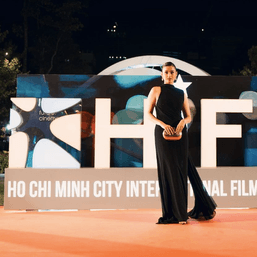
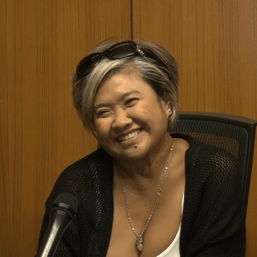
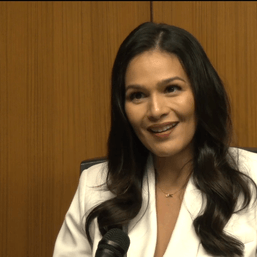
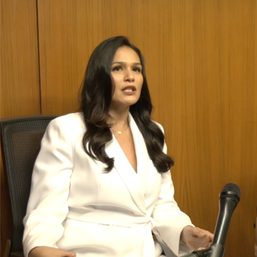

There are no comments yet. Add your comment to start the conversation.